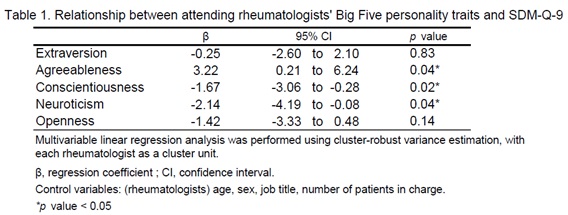Session Information
Session Type: Poster Session B
Session Time: 10:30AM-12:30PM
Background/Purpose: The treatment of systemic lupus erythematosus (SLE) remains challenging due to its complexity, despite the introduction of various promising treatments. Recent EULAR recommendations emphasize the necessity of shared decision-making (SDM) for the multidisciplinary and individualized management of SLE.1 Studies have indicated that certain physicians’ personality traits can affect patient outcomes.2 This study aimed to investigate the relationship between the Big Five personality traits of attending rheumatologists and SDM.
Methods: This cross-sectional study utilized baseline data from the Trust Measurements for Physicians and Patients with SLE (TRUMP2-SLE) study. Data were gathered from electronic medical records and self-administered questionnaires between June 2020 and August 2021. The primary exposures in this study were the Big Five personality traits (extraversion, agreeableness, conscientiousness, neuroticism, and openness) of the attending rheumatologists, measured by the Japanese version of the 10-Item Personality Inventory (TIPI-J) scale (1-7 points for each item). The outcome measure was shared decision-making (SDM), assessed by the patient version of the 9-item SDM Questionnaire (SDM-Q-9) scale (0-100 points). Multivariate linear regression was applied to evaluate the relationship between TIPI-J scores and SDM-Q-9 scores, using cluster-robust variance estimation with each rheumatologist as a cluster unit.
Results: In total, 493 patients with SLE were included in this study. The participants’ median (interquartile range [IQR]) age was 45.3 (36.0-54.9) years, and 437 (88.6%) were women. Their median (IQR) disease duration of SLE was 10.2 (3.9-17.3) years. The median (IQR) score of the SDM-Q-9 for the patients was 75.6 (66.2-88.9). The median (IQR) age of the 43 attending rheumatologists was 39.0 (34.0-43.0) years, and 10 (23.3%) were women. The median (IQR) number of patients per attending rheumatologist who participated in this study was 4 (1.5-14.5). The median (IQR) scores of each component on the TIPI-J scale were as follows: extraversion, 4.0 (3.0-5.0); agreeableness, 5.0 (4.5-5.5); conscientiousness, 3.0 (3.0-4.0); neuroticism, 3.5 (3.0-4.5); and openness, 4.0 (3.0-5.0). Multivariable linear regression analysis showed that higher agreeableness was related to a higher SDM-Q-9 score, while higher conscientiousness and neuroticism were negatively related to SDM-Q-9 scores, even after adjusting for confounding variables (Table 1).
Conclusion: Neuroticism and conscientiousness are reportedly personality traits related to perfectionism.3 The results of our study suggest that physicians’ perfectionism in the treatment of SLE negatively affects SDM.
References
1. Fanouriakis A, et al. EULAR recommendations for the management of systemic lupus erythematosus: 2023 update. Ann Rheum Dis. 2024;83:15-29.
2. Sada K-E, et al. Grit personality of physicians and achievement of treatment goals in patients with systemic lupus erythematosus. Rheumatology. 2023;62:2154-2159.
3. Stricker J, et al. Multidimensional Perfectionism and the Big Five Personality Traits: A Meta-Analysis. Eur J Pers. 2019;33:176-196.
To cite this abstract in AMA style:
Morishita S, Sada K, Kudo M, Dobashi N, Yoshimi R, Sakurai N, Hidekawa C, Shimojima Y, Kishida D, Ichikawa T, Miyawaki Y, Hayashi K, Shidahara K, Ishikawa Y, Oguro N, Yajima N, Kurita N. The Negative Impact of Physicians’ Neuroticism and Conscientiousness on Shared Decision Making in Patients with Systemic Lupus Erythematosus: The TRUMP2-SLE Project [abstract]. Arthritis Rheumatol. 2024; 76 (suppl 9). https://acrabstracts.org/abstract/the-negative-impact-of-physicians-neuroticism-and-conscientiousness-on-shared-decision-making-in-patients-with-systemic-lupus-erythematosus-the-trump2-sle-project/. Accessed .« Back to ACR Convergence 2024
ACR Meeting Abstracts - https://acrabstracts.org/abstract/the-negative-impact-of-physicians-neuroticism-and-conscientiousness-on-shared-decision-making-in-patients-with-systemic-lupus-erythematosus-the-trump2-sle-project/

